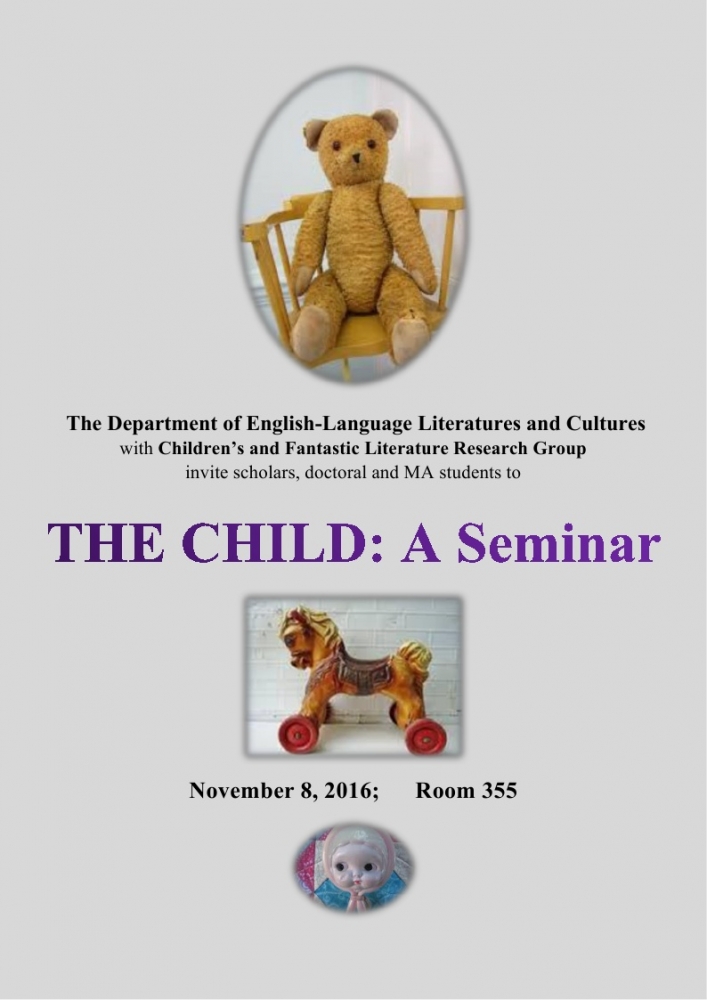Seminarium pt. Dziecko
Katedra Kultur i Literatur Anglojęzycznych
Instytutu Anglistyki i Amerykanistyki
oraz Pracownia Badań nad Literaturą Dziecięcą i Fantastyczną
zaprasza na seminarium pt.
DZIECKO
które odbędzie się we wtorek 8 listopada 2016 w Instytucie Anglistyki i Amerykanistyki na Wydziale Filologicznym, budynek Neofilologii, ul. Wita Stwosza 51, sala 355.

Chociaż pojęcie dziecka wydaje się jasne z biologicznej perspektywy etapów rozwoju człowieka, jego kulturowe definicje są rozmaite i zależne od wielu kontekstów, np. prawa, pedagogiki, pediatrii, psychologii, językoznawstwa, mody, literatury i filmu czy marketingu. Dzieciństwo może wykluczać czas niemowlęctwa lub przeciwnie: zawierać nawet stadium płodowe; także wiek osiągania dorosłości jest umowny i choć zazwyczaj wyznacza go wiek lat 18, to czasem jest to 21. Rozmaicie definiują dziecko różne epoki i role przyjmowane narzucane kontekstami rodziny, szkoły, zabawy i świata społecznych interakcji. Znacząco zmienne są również relacje między dzieckiem a Naturą (też rozmaicie rozumianą w różnych epokach i kontekstach) oraz koncepcja dziecięcej niewinności. Ponadto, różnie określa się prawa i obowiązki dziecka, a także obszary kulturowe, w których dziecko może (lub nie może) uczestniczyć, takiej jak, na przykład, polityka, wojna, czy seks. Wiele epok historycznych dzieci po prostu ignorowało, ale obecnie dzieciństwo uważa się za kluczowy etap rozwojowy, a o potrzeby dzieci dbają specjalnie powołane instytucje. W literaturze, filmie i sztukach plastycznych postać dziecka może skupiać problemy danego obszaru lub epoki kulturowej albo też stanowić metaforyczny znak wyrażający znaczenia psychologiczne, filozoficzne, teologiczne czy metafikcyjne.
Ponieważ pojęcie dziecka można rozważać w ramach różnych dyscyplin, zapraszamy badaczy z rozmaitych dziedzin – także doktorantów i studentów piszących prace magisterskie. Prezentowane referaty mogą mieć charakter krótkiego komunikatu o prowadzonych badaniach lub nieco dłuższej prezentacji ich wyników: od 5 do 15 min.
Artykuły napisane na podstawie wygłoszonych referatów mogą wejść do książki planowanej przez Pracownię Badań nad Literaturą Dziecięcą i Fantastyczną na rok 2017.
prof. UG dr hab. Jadwiga Węgrodzka e-mail: angjw@ug.edu.pl
On behalf of The Department of English-Language Literatures and Cultures
together with Children’s and Fantastic Literature Research Group
I would like to invite you to participate in a seminar focused on the concept of
THE CHILD
The seminar will be held on November 8, 2016 in the room 355.
Though the concept of the child may appear quite clear from the biological perspective of human development, its cultural definitions and uses vary considerably depending on numerous aspects. Even biological definitions, however, are culturally negotiable as, for instance, the legal age of majority is usually defined as 18 but sometimes it is 21; childhood may be separated from infancy or, contrarily, include the foetus stage. The child is understood differently in various epochs and in various areas such as the law, pedagogy, paediatrics, psychology, linguistics, marketing, fashions, literature, or film. The child appears in different roles in the context of school, family, playground and the social world at large. The child’s relation to Nature (itself a cultural concept) is also tellingly changeable, as is also the notion of the child’s innocence. Moreover, the rights and duties of children are variously defined, as well as cultural areas in which children are able (or not able) to participate, such as politics, war, or sex. While in many historical periods children were largely ignored, nowadays their importance seems obvious: not only is childhood recognised as a crucial formative period, but many institutions cater to children’s needs. In literature, film or pictorial arts the figure of the child may testify to various concerns of the cultural period or area; the child may also become a metaphorical sign expressing psychological, philosophical, theological or metafictional meanings.
As the concept of the child exceeds the borderlines of any single discipline, papers from different research areas are invited. The papers may range from 15 to 5 min. presentations and may refer to finished projects, work in progress, as well as to possible areas of interest.
Doctoral students and MA students are also cordially invited.
The papers may become a part of the publication planned by the Children’s and Fantastic Literature Research Group for 2017.
prof. UG dr hab Jadwiga Węgrodzka
e-mail: angjw@ug.edu.pl
Data publikacji: czwartek, 29. Wrzesień 2016 - 12:43; osoba wprowadzająca: Anna Malcer-Zakrzacka Ostatnia zmiana: poniedziałek, 7. Listopad 2016 - 08:49; osoba wprowadzająca: Anna Malcer-Zakrzacka




